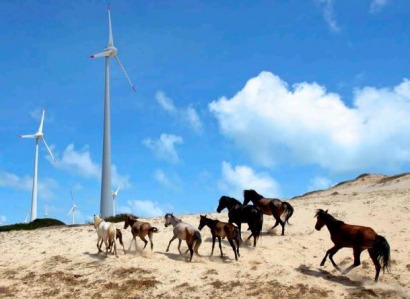
"Renewables are becoming ever more central to our low-carbon lifestyles, and the record-setting investments in 2015 are further proof of this trend,” said United National Environment Programme Executive Director Achim Steiner in a written statement. “Importantly, for the first time in 2015, renewables in investments were higher in developing countries than developed."
"Global Trends in Renewable Energy Investment 2016," the 10th edition of the annual publication issued by the UN Environment Programme, says the annual global investment in new renewables capacity, at $266 billion, was more than double the estimated $130 billion invested in coal and gas power stations in 2015.
The report, launched today by the Frankfurt School-UNEP Collaborating Centre for Climate & Sustainable Energy Finance and Bloomberg New Energy Finance (BNEF), highlights that all investments in renewables, including early-stage technology and research and development as well as spending on new capacity, totalled $286 billion in 2015, some three per cent higher than the previous record in 2011.
Since 2004, the world has invested an inflation-unadjusted $2.3 trillion in renewable energy.
Just as significantly, developing world investments in renewables topped those of developed nations for the first time in 2015, the report indicates.
Helped by further falls in generating costs per megawatt-hour, particularly in solar photovoltaics, renewables excluding large hydro made up 54 per cent of added gigawatt capacity of all technologies last year. It marks the first time new installed renewables have topped the capacity added from all conventional technologies.
The 134 GW of renewable power added worldwide in 2015 compares to 106 GW in 2014 and 87 GW in 2013. Were it not for renewables excluding large hydro, annual global CO2emissions would have been an estimated 1.5 gigatonnes higher in 2015.
"Access to clean, modern energy is of enormous value for all societies, but especially so in regions where reliable energy can offer profound improvements in quality of life, economic development and environmental sustainability," Steiner said. "Continued and increased investment in renewables is not only good for people and planet, but will be a key element in achieving international targets on climate change and sustainable development."
"By adopting the Sustainable Development Goals last year, the world pledged to end poverty, promote sustainable development, and to ensure healthier lives and access to affordable, sustainable, clean energy for all. Continued and increased investment in renewables will be a significant part of delivering on that promise," he added.
Meanwhile, Michael Liebreich, chairman of the advisory board at Bloomberg New Energy Finance, said global investment in renewables capacity hit a new record in 2015, far outpacing that in fossil fuel generating capacity despite falling oil, gas and coal prices.
“It has broadened out to a wider and wider array of developing countries, helped by sharply reduced costs and by the benefits of local power production over reliance on imported commodities," he said.
As in previous years, the report shows the 2015 renewable energy market was dominated by solar photovoltaics and wind, which together added 118 GW in generating capacity, far above the previous record of 94GW set in 2014. Wind added 62 GW and photovoltaics 56 GW. More modest amounts were provided by biomass and waste-to-power, geothermal, solar thermal and small hydro.
In 2015, more attention was drawn to battery storage as an adjunct to solar and wind projects and to small-scale PV systems. UNEP highlighted that energy storage is of significant importance as it is one way of providing fast-responding balancing to the grid, whether to deal with demand spikes or variable renewable power generation from wind and solar. Last year, some 250 MW of utility-scale electricity storage (excluding pumped hydro and lead-acid batteries) was installed worldwide, up from 160MW in 2014.
For additional information:

